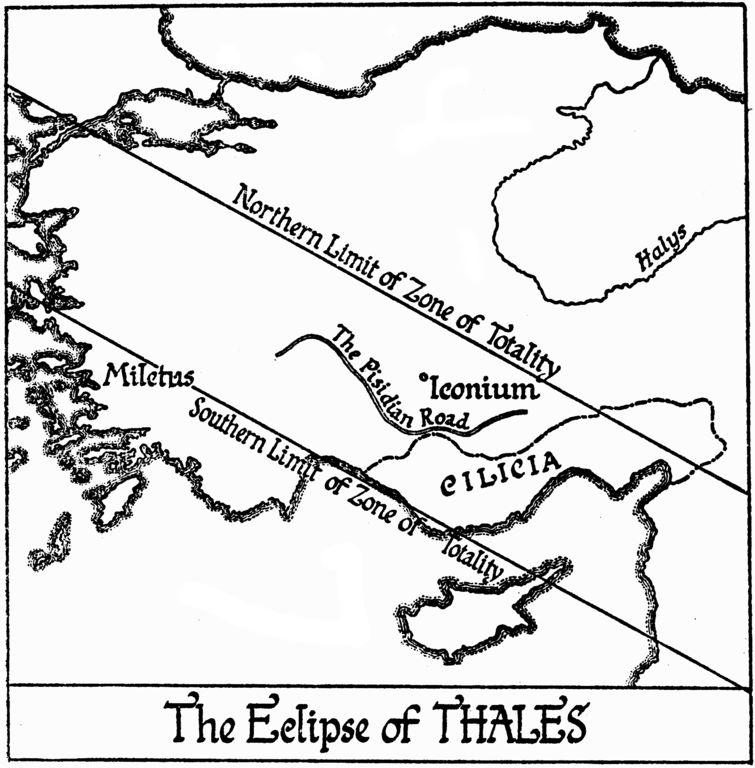Picture this: two raging kings have been at war for five years now. Lives have been lost, battles have been fought, and in the current moment, their armies are locking horns in active aggression. Suddenly, the sky that was till now filled with the clanking of armor and spurting of blood, turns into a blanket of darkness as a solar eclipse pervades the horizon. As day turns into night within minutes, soldiers on both sides drop their axes and spears, watching stunned as the play of nature overshadows the wrath of man. Both kings decide to call a truce.

Photo: opapaty / 8 images
Tales of history are no less than those of a make-believe fairy land; this one in particular has stunned astronomers and historians alike for centuries now. According to an account written by Greek historian Herodotus, the battle took place in Asia Minor. Aylattes, the king of Lydia, was fighting Cyaxares, king of the Medians or present day Iranians, somewhere along the River Halys in what we today know as Turkey. But the war was halted abruptly by a near total solar eclipse, the first ever that was predicted in advance. This went down in history as the Battle of the Eclipse.

Thales of Miletus
The eclipse occurred on May 28, 585 B.C. Herodotus suggests that Greecian astronomer and mathematician, Thales of Miletus, had predicted it way before it happened. This was why the eclipse also came to be identified as the Eclipse of Thales by many. His city Miletus itself sat on the edge of the path of totality, and though was not directly shadowded by it, witnessed the event closely. What’s strange is that the doyen could only pinpoint the exact year of the event but not the date or time. Predicting a solar eclipse is tough, with the moon falling the earth’s shadow of the sun for only seven and a half minutes. Yet any calculations that can gauge the coming of an eclipse can predict it down to the exact time. Over centuries, modern scientists have calculated backwards to determine the exact date of the eclipse that corresponded accurately with the description provided by Herodotus and this one matches the closest.

The path of totality
However, there have been many who have refuted the historian’s account of the solar event. In ‘Thales’ Eclipse’ Alden A. Mosshammer discusses the various arguments and hypotheses that have been put forward by analysers of the event. For instance, Otto Neugebaue suggests in his works that neither Thales nor his Babylonian contemporaries had the means or medium to predict such an event back then. A theory suggests that even if his claims are indulged, and Thales in fact had access to previous astronomical data of Miletus to refer to, his predictions would have landed him on 18 May 584 B.C. A solar eclipse did in fact occur on this date, but it was too small to be significant. What was significant was the near total eclipse which Thales witnessed a year before when the battle was in action. His predictions were saved because due to calendar irregularities, Thales had predicted the time frame of a year instead of a particular date, and the eclipse ended up falling within that year.
Another loophole is the accuracy of Herodotus’s account when compared with the data of previous cycles. Many say that the Babylonians kept extensive records. But the lack of empirical evidence has suggested that there was no means to keep such data so early on in time, which means that the account of Thales’s prediction is probably a tale of hearsay passed on through oral traditions. Thales was a man of high reputation, having developed Egyptian theorems of geometry to calculate the distance of ships and measure the height of pyramids before Euclid went on to codify them. It is plausible that his accomplishments were aggrandised by staunch followers over time.
Herodotus’s chronology is questionable as well. Many have come out to suggest that it was Astyages and not Cyaxares who was king at the time of the battle. Pliny, the first person to ever give account of the battle, named only the Lydian king Alyattes in his work, and the name of the Median king has remained under scrutiny ever since.
While accounts of grandeur have associated Thales’s name with the great battle time and again, there’s one tiny detail many miss out on. As Herodotus described the coming of the eclipse, he said “day suddenly became night.” But it had been following a set path of totality, and did not pass the exact location of the battle until right before sundown. The eclipse began near river Halys at 5:30pm and peaked around 6:25pm. At a time when the darkness of night was already expected, could the soldiers have been so taken by the shadow of the eclipse that it inspired them to give up their arms?
Despite questions and constructions, the truth of the historical event has remained unfazed against the scrutiny of time. It was at the Battle of the Eclipse that Medians and Lydians finally met with peace. A treaty was negotiated with the arbitration of the kings of Cilicia and Babylon and the river Halys became the border between the lands of the two contending forces. Whether it was the Eclipse of Thales that caused it, or an unnamed force of mercy between warring individuals, one will never know.
References
# Wired
# Thales’ Eclipse
# On the Eclipse of Thales, Cycles and Probabilities












Comments
Post a Comment